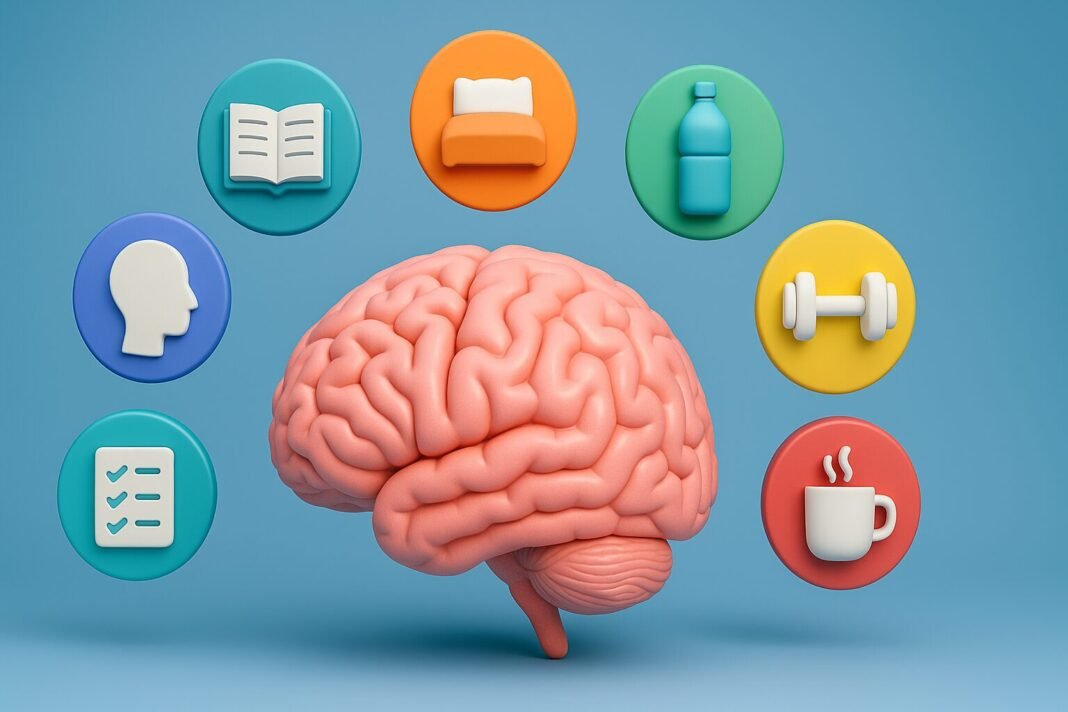
In today’s fast-moving digital world, mental clarity often feels like a luxury. Notifications, information overload, and chronic stress compete for our attention at every moment. As a result, many professionals, students, and business owners find themselves feeling foggy, distracted, and drained before lunch.
But here’s the good news: mental clarity is not some innate trait you either have or don’t. It’s a skill. And like any skill, it can be trained, sharpened, and optimized.
This guide will walk you through 7 practical, science-backed habits that can boost your cognitive performance, improve your emotional regulation, and help you stay sharp throughout your workday. These aren’t gimmicks or hacks they’re sustainable daily practices you can start today.
Table of Contents
1. Why Mental Clarity Is So Hard to Achieve Today
We live in an age of distraction. Studies show that the average person checks their phone 96 times a day. Between email overload, back-to-back Zoom calls, and the dopamine-fueled scroll of social media, our brains are constantly switching tasks a process that drains mental energy and erodes attention.
Add to this poor sleep, irregular meals, and sedentary work routines, and it’s no wonder people feel foggy and unfocused by mid-morning.
Mental clarity isn’t about thinking harder. It’s about removing the noise so your brain can think better.
2. The Real Consequences of Mental Fog
When you don’t address the root causes of poor mental clarity, the ripple effects touch every part of your life:
- Slower Decision-Making: You take longer to assess options and feel less confident in your choices.
- Productivity Drops: Tasks that should take 30 minutes stretch into hours.
- Emotional Drain: You’re more irritable, anxious, or overwhelmed.
- Relationship Tension: Mental fatigue reduces your ability to be present with colleagues or loved ones.
But with consistent habits, these patterns can be reversed.
3. 7 Daily Habits to Sharpen Focus and Boost Brain Power
1. Build a Calming Pre-Sleep Ritual
Time Needed: 30–60 minutes
Your brain can’t perform at its best without quality sleep. A pre-sleep routine sends your body signals that it’s time to wind down, reducing late-night overthinking and screen-induced overstimulation.
Try This:
- Turn off screens 60 minutes before bed
- Stretch lightly or do breathing exercises
- Use white noise or soft music to signal wind-down
- Read a physical book or journal by hand
Placement Tip: Insert image of a peaceful pre-bedtime setup next to this section (e.g., dim lighting, journal, cup of tea).
2. Time Your Meals and Movement Intelligently

Time Needed: Meal prep (~10 min), Exercise (~20–40 min)
Eating processed food or working out too late can spike energy at the wrong time. Instead, eat whole foods with healthy fats, proteins, and fiber. Time workouts at least 3 hours before sleep to allow the body to wind down.
Action Tip: Avoid heavy meals and alcohol after 8PM. Try morning walks or lunchtime stretching.
Image Suggestion: Healthy meal prep bowl beside laptop or light morning workout photo.
3. Journal to Clear Your Mental Desktop
Time Needed: 5–15 minutes
Writing your thoughts down can stop the mental loops that keep your brain running in the background.
Try one of these:
- Gratitude list
- Daily goals
- Brain dump before bed
Pro Tip: Pen and paper journaling is often more effective for reflection.
Placement Tip: Link to internal article: “7 Micro Habits That Improve Productivity Instantly**” after this section.
4. Practice Daily Mindfulness or Meditation

Time Needed: 5–20 minutes
Just five minutes of intentional stillness each day can sharpen awareness, reduce anxiety, and improve sleep. Apps like Insight Timer, Headspace, and Calm make it accessible.
Good Moments to Meditate:
- First thing in the morning
- During lunch break
- Before bedtime
External Link: Insert link to Mindful.org guide to meditation
5. Anchor Your Morning with One Non-Negotiable Habit
Time Needed: 10–20 minutes
Start your day by anchoring it with one stabilizing habit:
- Morning pages (freewriting)
- Cold shower
- Reading 10 pages
- Mindful coffee time
The power lies in consistency, not complexity.
6. Use Strategic Breaks to Refresh Your Brain
Time Needed: 5–15 minutes every 60–90 minutes
The brain wasn’t built for back-to-back focus. Use breaks to:
- Go outside
- Listen to instrumental music
- Do 20 jumping jacks
External Link Placement: Link to Harvard Health article on how movement improves brain function
7. Make Your Clarity Habits a Scheduled Priority
Treat your focus rituals like work meetings: non-negotiable.
- Add them to your calendar
- Use phone reminders
- Tell a friend for accountability
Image Suggestion: Visual of time-blocked calendar with “Mindfulness”, “Stretch”, and “Journal” entries.
4. Comparison Table of Focus Habits
| Habit | Time Needed | Best For |
| Pre-sleep routine | 30–60 min | Mental reset before bed |
| Strategic meal + exercise | 10–40 min | Sustained energy + better sleep |
| Journaling | 5–15 min | Mental clarity + emotional health |
| Mindfulness/meditation | 5–20 min | Focus + anxiety reduction |
| Morning anchor routine | 10–20 min | Daily consistency + momentum |
| Brain-refresh breaks | 5–15 min | Preventing burnout |
| Time-blocking habits | Varies | Habit consistency |
5. A 3-Day Starter Plan for Clarity
Day 1:
- Wake up and journal for 5 minutes
- Eat a balanced breakfast
- Mid-morning walk
- Set screen curfew: no screens after 9PM
Day 2:
- 5-minute morning meditation
- Brain dump journal before bed
- Replace afternoon coffee with stretching
Day 3:
- Track how you feel after each focus habit
- Review what worked best
- Adjust time blocks in your calendar
Internal Link Suggestion: End this section with: “Want more brain-boosting strategies? Read: How to Regain Focus in 5 Minutes or Less“
6. Bonus Tools and Apps
- Insight Timer (free meditation)
- Notion or Evernote (journaling templates)
- Sleep Cycle (tracks sleep quality)
- Focus@Will (music for deep work)
- Google Calendar (schedule your rituals)
7. Final Thoughts
Mental clarity isn’t about doing more it’s about creating space for your brain to do what it does best. By setting the stage with sleep, nutrition, mindfulness, and structure, you empower your mind to perform without distraction.
It starts with one change. Try one of the habits today, then stack another tomorrow.
Your focus is a skill and like any skill, you can train it.





